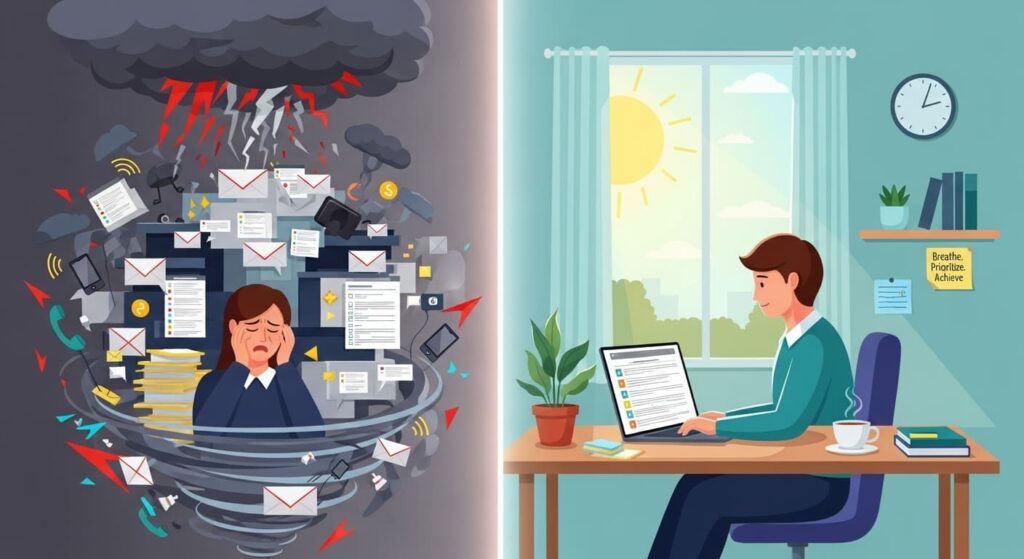Introduction
Living with anxiety can make work feel daunting, but there are jobs that align with your needs and help you thrive. Anxiety affects millions—about 40% of people with anxiety face daily challenges that impact their work.
The right job can reduce stress and play to your strengths. This article explores how anxiety impacts work, what makes a job suitable, and specific careers for people with anxiety, along with practical tips and real stories to guide you toward a fulfilling career.
Understanding Anxiety and Its Impact on Work

Anxiety disorders, like generalized anxiety or social anxiety, bring symptoms such as worry, fatigue, or trouble focusing. In the workplace, these can show up as discomfort in meetings, difficulty with deadlines, or feeling overwhelmed by unpredictability.
Around 72% of people with anxiety say it interferes with their lives, including work, and it contributes to 12 billion lost workdays globally each year.
Women report higher work-related anxiety (71%) than men (54%). Knowing your triggers—like social interactions or chaotic schedules—helps you find jobs for people with anxiety that feel manageable and rewarding.
Key Features of Suitable Jobs for People with Anxiety
Certain job traits can make work less stressful for those with anxiety. Look for roles with:
Minimal Social Demands: Less teamwork or public speaking reduces pressure.
Flexible Hours: Control over your schedule helps manage stress peaks.
Remote Options: Working from home eliminates commutes and office noise.
Predictable Tasks: Routine duties offer stability and reduce surprises.
Independent or Creative Work: These allow focus without external demands.
These features make jobs for people with anxiety more sustainable, turning challenges into opportunities for success.
Top Jobs for People with Anxiety

Here are some career ideas that suit people with anxiety, with details on why they work, average salaries (USD), and entry points.
1. Freelance Writer or Content Creator
Writing is solitary, flexible, and often remote. You can focus on research or storytelling without face-to-face meetings. Salary: $50,000–$70,000. Start: Use platforms like Upwork or start a blog.
2. Graphic Designer
This creative role involves designing from your computer, often independently. It’s low-stress and suits detail-oriented minds. Salary: $45,000–$65,000. Start: Learn via online courses or a degree.
3. Accountant or Bookkeeper
Numbers offer structure and predictability. You work alone, often remotely, with clear tasks. Salary: $60,000–$80,000. Start: Entry-level roles or CPA certification.
4. Computer Programmer or Web Developer
Coding is logical and solitary, with remote work common. It’s ideal for problem-solvers. Salary: $70,000–$100,000. Start: Bootcamps or self-study.
5. Librarian or Archivist
Quiet settings with organized tasks. Helping patrons is low-key. Salary: $50,000–$60,000. Start: Library science degree.
6. Gardener or Landscaper
Working outdoors with nature is calming and physical. It’s low-stakes and often independent. Salary: $30,000–$50,000. Start: Apprenticeships or certifications.
7. Data Entry Specialist or Transcriptionist
Repetitive tasks with no social demands, often remote. Perfect for detail lovers. Salary: $35,000–$45,000. Start: Basic computer skills.
8. Animal Care Worker or Vet Tech
Animals offer comfort without judgment. Roles like grooming are hands-on. Salary: $30,000–$40,000. Start: Short training programs.
9. Massage Therapist
Quiet, one-on-one work that’s therapeutic for you and clients. Salary: $40,000–$60,000. Start: Certification required.
10. Online Tutor
Teach from home on your schedule, focusing on familiar subjects. Salary: $40,000–$60,000 part-time. Start: Degree or expertise in a field.
These jobs for people with anxiety cater to different interests, from creative to analytical, and prioritize low-stress environments.
Remote and Flexible Work Options

Remote work is a lifeline for those with anxiety, offering control over your space and schedule. Fields like tech, writing, and virtual assistance thrive here. A study shows 80% of workers feel workplace stress, but remote roles reduce this by offering autonomy. Platforms like FlexJobs list jobs for people with anxiety that are fully remote or hybrid.
Tips for Managing Anxiety in Any Job
Even in ideal roles, anxiety can surface. Try these strategies:
Know Your Triggers: Pinpoint what sparks anxiety, like presentations, and plan ahead.
Breathe Deeply: Slow breathing calms you during tense moments.
Set Limits: Break tasks into steps and avoid overcommitting.
Find Support: Share needs with a colleague or therapist.
Prioritize Self-Care: Sleep, eat well, and exercise to stay grounded.
Practice Mindfulness: Focus on the present to curb worries.
Schedule Worry Time: Dedicate a few minutes to process concerns, then let them go.
These habits can make any job more manageable, helping you thrive in jobs for people with anxiety.
Real-Life Success Stories
Real stories show what’s possible. Morra Aarons-Mele, an author, used her anxiety as a strength in her writing career, leveraging her sensitivity for insight. Mat overcame panic attacks by taking a warehousing job, where routine tasks built his confidence. Lori found stability as a buyer’s assistant, managing her anxiety and depression in a predictable role.
Spencer Carter retrained as a counselor after burnout, finding purpose in helping others. A Reddit user shared switching to a remote tech job, overcoming interview fears for a calmer career. These examples highlight how jobs for people with anxiety can lead to success.
Resources for Support
You don’t have to navigate this alone. The Anxiety and Depression Association of America (ADAA) offers workplace tips. The National Institute of Mental Health (NIMH) provides anxiety disorder resources. Job platforms like Indeed list anxiety-friendly roles, and Reddit communities share advice. Consider therapy or disability employment services for tailored support.
Conclusion
Jobs for people with anxiety are about finding roles that match your needs and strengths. From remote writing to structured accounting, there’s a path for you. Use strategies like mindfulness and support networks to succeed.
Start by exploring your triggers and job listings, and take small steps toward a career that feels right. You can build a work life that’s not just manageable but truly rewarding.
